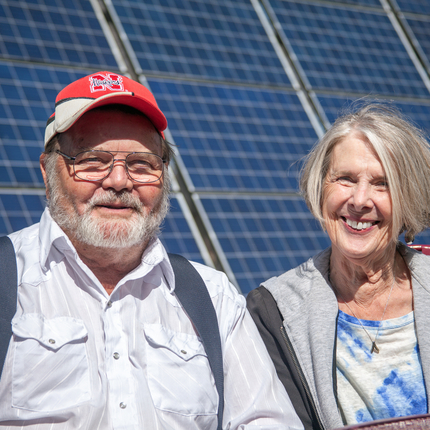People have traversed the world to visit 365 acres of certified organic fields and pastures nestled in the valley of West Bow Creek in northeast Nebraska.
Linda and Martin Kleinschmit welcomed their visitors with practical wisdom and an open mind, even when they disagreed.
They compared notes with a man from Argentina on pasture seeding. A farmer from Australia once insulted their corn silo. And a generation of Nebraska women gathered around their kitchen table to discuss holistic family business practices and being equal partners in farm enterprises.
Martin and Linda have dedicated their lives to sustaining family farms, pioneering work in organic farming, and advancing renewable energy. The Center for Rural Affairs presents them with the 2021 Seventh Generation Award to acknowledge them for their lifetime of service. The award is given to people who have made significant contributions to improving rural life and protecting our land and water.
Building a rural life together
Martin and Linda recently sat at the wooden kitchen table inside their warmly furnished farmhouse to tell their story. Martin pointed northwest. He was born in a house that used to stand on top of the hill just over there. Martin’s grandfather found his way to Nebraska from Germany by way of Wisconsin.
Linda grew up in Valentine and spent time on her father’s family ranch west of town. Her father was a carpenter, and her mother, widowed at 41, worked in a clothing store.
Both Linda and Martin attended the University of Nebraska-Lincoln. Martin majored in animal science and Linda in elementary education.
Martin fell in love twice while attending college in the 1960s.
The first time was on a night out with friends in Yankton, South Dakota. That’s the night he met Linda.
The second time was in the driver’s seat of a 1952 John Deere tractor. Martin’s dad, Cletus, had asked him to replant a field of corn that worms had wiped out. It was the first of many fields Martin would sow.
He knew he wanted to farm in Bow Valley, just like his father and grandfather. In 1970, Martin’s father suffered a heart attack that left him unable to cope with the rigorous demands of a farm. Martin and Linda moved their young family from Germany, where Martin was stationed in the U.S. Army, back to Nebraska to run for the homestead.
Linda knew little about the day-to-day hardships of making a farm family work. She worried about living up to expectations and leaving behind her own friends and family to settle in a new community. Even married to a Kleinschmit, she sometimes felt like an outsider.
But the women in Martin’s family gave her gardening tips, taught her how to bake kolaches, and introduced her to Schafkopf, an old German card game that translates to Sheephead.
“If I hadn't learned how to play Sheephead, I would have just been sitting in a corner all the time. They played that at everything,” said Linda.
She became known as someone not afraid to challenge conservative traditions. Women leaders at their church told her, “That’s not the way we do things,” and “Don’t do anything to upset the husbands.”
But Martin and Linda are critical thinkers, and minding convention is not how they live their lives.
A lifetime of innovation
Martin and Linda’s lifetime of service and innovation shows their commitment to making the world better.
Vince Rossiter, a Hartington banker and a family friend, introduced Martin and Linda to the Center for Rural Affairs. From 1976 to 1980, Martin and his brother participated in the Center’s Small Farms Energy Project, designed to help farmers discover and develop viable alternatives and renewable energy systems for their farms.
Linda joined the movement to improve rural life and helped organize the Center’s first women’s impact group. She encouraged women to be active partners in the farm business.
“Farms were being lost because people are getting divorced because women are really unhappy,” Linda said. “We needed a women’s group to talk about why they were unhappy and what they needed.”
Martin was a Center employee for 17 years, working on issues like building soil, wind power for farms and communities, and organic farming. He tested many of these ideas on his farm.
He was among the first to tell a national audience that farmers are willing and able to make changes that can affect global warming.
After retiring, he oversaw a project to introduce farmers to organic farming, resulting in 60,000 acres enrolled in organic transition in Nebraska. Today, Martin runs a business that installs solar panels to take advantage of Nebraska’s ample sunshine and to net meter electrical power with the local rural electric association.
Linda’s long service list includes time as a Center for Rural Affairs Advisory Committee member and on the Administrative Council for U.S. Department of Agriculture North Central Region (NCR) Sustainable Agriculture Research and Education (SARE) program. She was the professional development program assistant coordinator for the NCR-SARE 12-state region for six years and serves on the Nebraska Sustainable Agriculture Society board of directors. She has also served on the Nebraska Farm Service Agency State Committee, State Board of Directors for Nebraska Farmers Union, League of Rural Voters, the National Campaign for Sustainable Agriculture, the steering committee for Ogallala Commons, and the state and national steering committees for the W.K. Kellogg Foundation’s Integrated Food and Farming System Initiative.
Martin and Linda rent their 365 acres of organic crops and pastureland to a young farmer who maintains the organic certification while they continue their small business pursuits by operating a vacation rental at the family homestead called the Farmhouse Inn.




